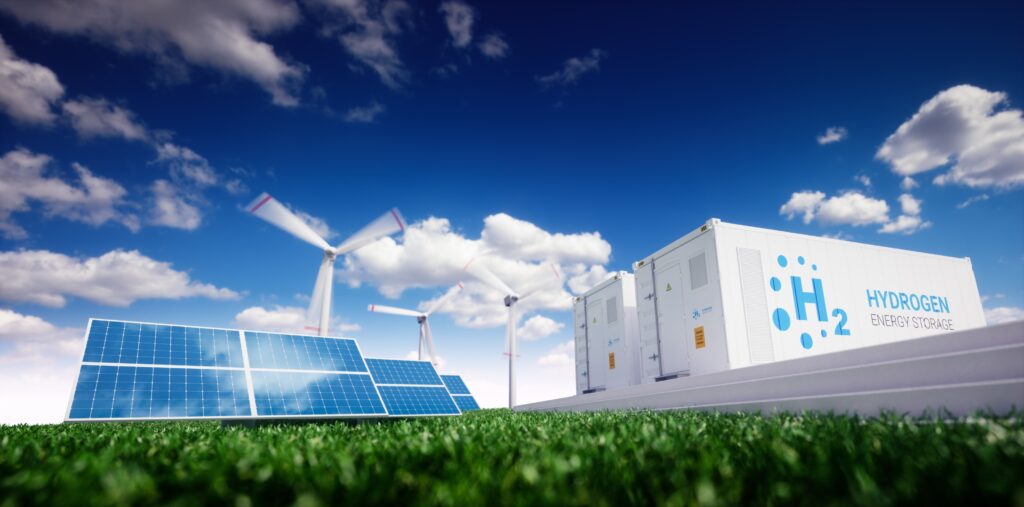First high-level round table Hydrogen and Green Chemistry puts ambitions right to the edge
The Hague, 18 December 2020
In order to be CO2 neutral by 2050, significant upscaling of technology and intensification of research and innovation in hydrogen and green chemistry will be needed in the coming years. Therefore the ECCM committee, which advises the government on hydrogen and electrochemistry, and the Ministry of Economic Affairs & Climate Policy (EZK) jointly have brought the sectors together that can make this transition happen. During a roundtable discussion, the participants agreed on combined targets for the cost reduction of hydrogen and electrolysers, the circularity of CO2 and the generation of sustainable electricity. The participants have collectively agreed in a statement to speed up the implementation of these targets.
Round table Hydrogen and Green Chemistry
The articulated ambition requires commitment from both private and public partners. That is why on the 17th of December the Ministry of Economic Affairs and Climate Policy brought together CEOs from industry and board members of the knowledge institutions in a round table for Hydrogen and Green Chemistry. They discussed what is needed to achieve the objectives for upscaling, cost reduction and innovation for hydrogen and green chemistry as stated in the Dutch climate agreement, the knowledge and innovation agendas of the mission-driven Top Sector and Innovation policy and the ECCM advisory report.

Shared vision
“In the cooperation with all parties involved, from producer to end user, there are unique opportunities to stimulate innovation and cost reduction in the Netherlands in an efficient way.” This is how Focco Vijselaar (DG Enterprise and Innovation) of the Ministry of Economic Affairs and Climate Policy summarised the conclusions of the round table. Both Focco Vijselaar and Sandor Gaastra (DG Climate and Energy) chaired this first high-level round table on Hydrogen and Green Chemistry. Richard van de Sanden (chairman ECCM): “Collaboration between stakeholders along the value chain is the crux for the hydrogen and green chemistry ambitions. The round table brings together the generation of electricity, technology producers, the chemical industry and end users. Steering the ambitions together, that is necessary and that is exactly what we are going to do.”
Agreements
The participants in the round table have agreed to work together on a number of concrete actions over the next six months. For example, together they will define milestones for the objectives towards 2030 and 2050 and carry out a SWOT analysis in order to adjust strategies and to manage risks. This also requires the development of a system model in order to be able to take the necessary sequential steps towards upscaling. The participants at the round table also want to make the involvement and commitment more concrete on behalf of their sectors and set up a national coordination structure to ensure coherent steering and acceleration of the objectives.
The round table will take place annually and will act as a catalyst to draw up ‘the state of the Netherlands’ at national level with regard to the realisation of the hydrogen and green chemistry ambitions of the government and the sectors involved at the table. In view of the urgency to elaborate on a number of implementation questions, the next round table will be organised within six months.
Result round table 17 December 2020
The Hydrogen and Green Chemistry round table is an initiative of the National Advisory Committee on Electrochemical Conversion & Materials (ECCM). The committee has been coordinating the R&D efforts of companies and knowledge institutes in the field of short-term hydrogen and systems integration and longer-term electrochemical conversion since 2017 on behalf of the government. During this period, a portfolio of research programmes and pilot and demo projects (TRL 1 to 7) has been built up. The ECCM Advisory Committee was set up by the Top Sectors Energy, HTSM and Chemistry and works together with the Ministry of Economic Affairs and Climate Policy and the Ministry of Education, Culture and Science, the top sectors and mission teams and the knowledge sector, NWO and TNO. More information: www.CO2neutraalin2050.nl.
Contact
If you have any questions or comments, please contact us:
Prof. Richard van de Sanden – chair ECCM committee
Email: secretariaat@eccm-mail.nl, phone: +31 70 349 4302
